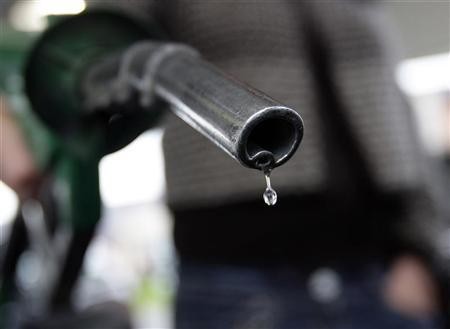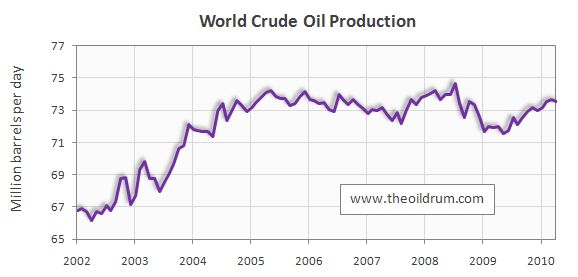352: $90/bbl oil - danger levels - about to get worse
12-07-2010

PropertyInvesting.net team
Oil Bull Run Has Just Started: For those of you who have been visiting the website for the last five or more years – this might not be a surprise to you. We are just entering a Peak Oil induced "oil price bull run". As global economies recover from the shock of the last oil price spike in July 2008 and the financial meltdown that it helped cause - the global economy will hit the roof because oil supplies have peaked.  Essentially, it won't matter if oil prices are $80/bbl, $120/bbl or $200/bbl – oil production will hardly budge. There is very little spare supply left – and Chinese oil demand continues to grow at 6% per annum (or 15% per annum for oil imports in view of their own oil production). Not enough oil is being exported from the oil exporting nations – mainly OPEC countries. But one of the key things to remember is that when oil prices sky-rocket, it has always led to a recession in western nations. Hence this time around, we certainly don’t expect anything different. The only question is – how far the oil price will rise before it comes back down again. It could be $100/bbl, $150/bbl or even $200/bbl – difficult to say. It will come down only when demand from western countries – namely USA and western Europe – drops caused by a recession or zero growth.
Essentially, it won't matter if oil prices are $80/bbl, $120/bbl or $200/bbl – oil production will hardly budge. There is very little spare supply left – and Chinese oil demand continues to grow at 6% per annum (or 15% per annum for oil imports in view of their own oil production). Not enough oil is being exported from the oil exporting nations – mainly OPEC countries. But one of the key things to remember is that when oil prices sky-rocket, it has always led to a recession in western nations. Hence this time around, we certainly don’t expect anything different. The only question is – how far the oil price will rise before it comes back down again. It could be $100/bbl, $150/bbl or even $200/bbl – difficult to say. It will come down only when demand from western countries – namely USA and western Europe – drops caused by a recession or zero growth.
$100/bbl: So expect from now on oil prices rising well over $100/bbl this winter – helped by cold weather, spooked financial markets, USA printing money like there is no tomorrow, the declining dollar and speculators parking this printed money in oil as a hedge against the declining dollar and increasing inflation.
Boom-Bust for PIGS: Higher oil prices will increase inflation, increase borrowing costs and ultimately reduce GDP growth in western oil importing nations – it will take six months to feed through. It always has done – the fundamental have not changed. Any sustained oil price above $100/bbl will lead to debt default in the PIGS Euro countries and more financial misery – with Greece, Spain, Italy, Portugal and Ireland being most exposed. So be careful, the action is just starting. And we’ll ke ep you posted as things develop on the website.
ep you posted as things develop on the website.
Peak Oil Was Six Years Ago! Remember, Peak Oil was 2005 (crude oil) and July 2008 (all oil liquids including synthetic oil from sugar, natural gas and corn, during the China Olympics). For six years, oil production has been flat. Yes - even though oil prices rose from $40/bbl to $147/bbl from 2005 to 2008, oil production did not increase - the market does not function when resources deplete to such an extent that the “easy oil gas gone”. Like an old oilfield, sometimes one can pump money-investment in, but not much happens in return. It’s like a clapped out car – more gas/fuel will not make it go any faster – so the investor would take their foot well off the accelerator otherwise they would be wasting fuel (or money-resources).
Investors Take Note: So for the smart investors - review our Special Reports on Peak Oil - and consider getting into oil investments as a hedge against property price declines in western oil impor ting nations. We are now into danger territory - there could be a short bull run on stock markets for about six months before high oil prices start to choke the economy off again. Watch out!
ting nations. We are now into danger territory - there could be a short bull run on stock markets for about six months before high oil prices start to choke the economy off again. Watch out!
Attractive Investments - Peak Oil positive exposure (or good hedge)
1 Biomass, forestry, land, food
2 Buying physical oil and oil futures
3 Gold, mining and metals
4 Oil, gas, coal exploration, development and production companies
5 Energy conservation, metering
6 Electric battery, charging, services, motors
7 Electric cars
8 Solar power in China
9 Property in oil centres (London, Aberdeen, Moscow, UAE, Olso)
Unattractive Investments - Peak Oil negative exposure
1 Western banks
2 Western retails companies
3 Shipping
4 Power stations
5 Airlines
6 Property in far flung places and USA and PIGS countries
7 Holiday homes
8 Car companies (powered by petrol-diesel, large cars)
9 Solar power in USA and PIGS (will not be able to afford to install it)
Low Growth West - High Growth East: Low cost oil, gas and energy has been the driver behind the massive western economic growth after WWII - as industralisation, construction booms and infra-structure developments led to huge wealth from USA to Greece, Spain to Norway. It was easy to build, transport and manufacture using lo cost energy. But things are changing. Input costs are rising and competition from eastern low cost centres is intense. Jobs are being lost in many of the oil importing western nations. The populations are aging. High social and public spending costs are acting as a huge drag to these economies. The fundamentals are not good. China will suck more and more resources into their super economy and India with 1.5 billion people is following just behind. 3 billion people all wanting the same standard of living as western Europeans and Americans. Resources will be shared. Growth in China will be 10%, but growth in the western world could stagnate completely. The best protective measure is to focus property investment in resource rich countries like Canada, Norway, Australia and possible London/UK. It's pretty simple and basic really. There is no point exposing your hard earnt cash to developed countries with aging populations, declining populations, high oil/gas/coal/metals import bills, and industry without any financial or manufacturing acumen.

1 Oslo yes, Rome no
2 Ontario yes, Washington no
3 Perth yes, Athens no
4 London yes, Madrid no
As oil prices rise, and the global financial systems start to shake again, with the Euro destablizing and US dollar declining - just consider the underlying causes. Shift to commodities rich countries. Shift away from countries that import all their commodities - unless there is a very good reason!
New Areas: There are huge oil resources available for exploitation in the world, but they are either:
1 In technologically demanding, environmentally sensitive and expensive areas (Arctic, Deepwater)
2 Environmentally damaging and water/cost intensive (Oil Sands)
3 Politically and economically challenging areas for western companies to access (OPEC countries)

It's Too Late: It's already too late for development to boost oil production significantly above today's levels. The boost in 2010 oil production came from oil developments kicked-off in 2006-2008 when oil prices were rising from $70/bbl to $147/bbl. By 2012 we will see the affects of the crash in 2009 and Gulf of Mexico spill in 2010 feeding through - whilst OPEC countries go slow on investing - to save oil for future generations. Expect flat oil production and demand increasing until the next western recession. For those expecting Iraqi production to save the day, it took 5 years for Saudi Arabia to increase its production capacity by 2 million bbls/day with no security threat or disruptions. Iraq has huge potential but production today is about 2.2 million bbbl/day – the same for the last 3 years. We expect production eventually to rise to about 5.5 million bbls/day by 2020 – possibly a little more, but this will not be enough to fill the gap in declines from other areas. The same is also the case for Brazil – it’s too little too late.

Renewables: In western Europe, government are trying to stimulate renewable energy investment, but frankly, again it’s too little too late. Part of the reason why it’s too late is that – during low oil price times when surplus money is (or was) available for investment in alternative energy sources, no such investments were made. Now high oil prices have hit, and deficits have increased. Just when investment is required – the money has run out. This is a pretty crude analysis of what has happened, but we think it’s fairly accurate. The UK is now getting more serious about trying to get alternative energy sources to help bridge any gap in energy requirements cause by the closing of old nuclear power plants and restrictions on coal burning– at least the UK has 80% of its oil needs and 60% of its gas needs produced indigenously from the North Sea. In a way, this is a bit depressing that, despite all the oil revenues, the previous government still managed to work up a massive deficit from public spending increases. It will be easier that most big oil/gas importing nations for the UK to sort the problem out – which is why in the longer term, we are far more optimistic about the UK than we are about Ireland, Spain, Italy, Greece and Portugal.
We hope this Special Report has been helpful. if you have any comments, please contact us on enquiries@propertyinvesting.net

Ali Al-Naimi Saudi Oil Minister


